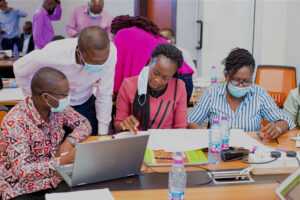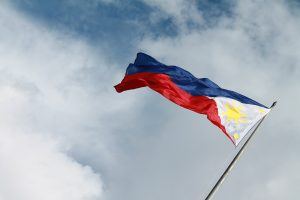Faces of Open Government: Cielo Magno
Rostros de Gobierno Abierto: Isabel Moya Pérez
Extractive transparencyAccording to OGP’s Articles of Governance, transparency occurs when “government-held information (including on activities and decisions) is open, comprehensive, timely, freely available to the pub... More is a commitmentOGP commitments are promises for reform co-created by governments and civil society and submitted as part of an action plan. Commitments typically include a description of the problem, concrete action... popular amongst members of the partnership. In the Philippines, reformers are working to help increase mechanisms for good governance and sustainability in the extractives industry.
In this month’s issue of Faces of Open Government, Cielo D. Magno, Undersecretary for the Department of Finance’s Fiscal Policy and Monitoring Group, shares her insights on how openness can uniquely impact the extractives industry, women, and government.
To start us off, tell us about yourself and what you’re looking forward to this year.
I look forward to seeing the operationalization of multi-stakeholder governance at the local level in the Philippines. For the past years, the world was monitoring the issues of red-tagging and shrinking civic space in the country. This is a big challenge for us but I am hopeful that the creation of more legitimate spaces for participation at the local and community levels will contribute to community empowerment and protection of community and environmental activists. The PH-EITI’s ambitious goal is to create and operationalize multi–stakeholder participation and governance at every level of the extractives value chain. I am hoping to see some of these happen this year.
At the global level, we are beginning to think about a standard for transparency and accountability in the renewable energyEnsuring universal access to sustainable, dependable, and affordable energy is critical to every aspect of prosperity. Increasing public oversight and transparency in the energy sector can help to ens... More sector. Hopefully, we will have something concrete before the end of the year. The principles of the Open Government PartnershipThe Open Government Partnership (OGP) is a multi-stakeholder initiative focused on improving government transparency, ensuring opportunities for citizen participation in public matters, and strengthen... More will be helpful in mainstreaming good governance in the renewable energy sector. Creating legitimate spaces for the public to engage governments and the private sectorGovernments are working to open private sector practices as well — including through beneficial ownership transparency, open contracting, and regulating environmental standards. Technical specificat... More and access to information are critical elements in building trust and establishing accountability
Imagine that you are sitting next to your younger self, just as you are about to start your career in economics and extractive transparency. What would you say to her?
I would tell her that economics is a tool that can be used to make the world a better place. Extractive transparency is one of those areas where a degree in economics can be of great value. The economic lens raises important questions regarding mining extractives. One of these is the opportunity cost of mining extraction which we should also always consider when we are making a decision to mine or extract. As a civil society member engaging in EITI, my technical expertise helped me effectively to engage the other stakeholders in the sector.
What is extractive transparency? How can it help improve extractive governance and impact the lives of citizens?
Extractive transparency means that stakeholders, especially the communities, have the right to access all the necessary information to be able to make informed decisions regarding the extraction of minerals. It means being part of the decision-making process, knowing what decisions are being made, and being open to standards that can be used to guide decisions on extractions.
Why and how did you advocate for the Philippine government to rejoin EITI? Were there other advocacies linked to it?
If the Philippines will pursue mining as a pillar for development, especially with the increase in demand for critical minerals, we have to make sure that mechanisms for good governance are in place. The EITI is important because it does not only promote transparency in the extractive sector but creates opportunities for multi–stakeholder governance. It can serve as an oversight on the regulationGovernment reformers are developing regulations that enshrine values of transparency, participation, and accountability in government practices. Technical specifications: Act of creating or reforming ... and the operation of the extractive sector. It can create legitimate spaces for communities to hold government and companies accountable. We must be transparent on how licenses are awarded and who the beneficial owners of these licenses are. We must have a genuine process of community consultation in getting the free, prior, and informed consent of indigenous communities; a mechanism on how companies contribute to the community and overall economic development; and a mechanism to ensure the companies are complying with social and environmental regulations. Multi-stakeholder oversight is very important in operationalizing all of these and EITI sets the standards for that.
Why is it important to have a specific focus on women and genderOGP participating governments are bringing gender perspectives to popular policy areas, ensuring diversity in participatory processes, and specifically targeting gender gaps in policies to address gov... More issues in extractive governance? What can the open government community do to support those efforts?
There are impacts that are uniquely experienced by women in the extractive sector. At the community level, for example, since women are traditionally responsible for household work, the negative effects of mining on the water supply make women’s chores more challenging for them. Another example is prostitution. Mining activities also create demand for sex workers. They are subjected to the negative effects of prostitution, which include physical and mental health problems, violence, and social isolation. With respect to employment opportunities in the extractive sector, women are usually excluded from opportunities for decent work and are being discriminated against. Women bear the brunt of environmental and social disruptions. A gender lens will ensure that resource extraction must take into account the impact of extraction on the lives of women. Taking into account the impact of extractive operation and governance on gender. This acknowledges the unique impact of extractives in the sector and recognizes the importance of hearing their voices on issues related to extractives and creating legitimate spaces for them to participate in governance. OGP can help create those legitimate spaces for women to participate in decision-making and can make data/information available to inform policymakers on the plight of women in the extractive sector.
La Semana de Gobierno Abierto (OGW por sus siglas en inglés) se celebra en mayo de cada año para reunir a los gobiernos y la sociedad civil y encontrar soluciones a los problemas más apremiantes que enfrentan las comunidades a través de eventos, debates públicos, webinars y más. Isabel Moya Pérez es la Subdirectora General de Gobierno Abierto de España y comparte lo que hizo su país durante su propia OGW y cómo la nueva estrategia de OGP puede ayudar a fomentar democracias más abiertas y responsables.
¿Por qué la Semana de gobierno abierto es tan importante para España?
España es un país abierto, que ha hecho de la mejora de su democracia un objetivo compartido por todas sus instituciones públicas. La Semana del Gobierno Abierto es una oportunidad para que todas las personas en el país, vivan donde vivan, conozcan mejor cómo funcionan por dentro sus administraciones, en qué estamos trabajando y cómo se prestan los servicios públicos. La Semana es también un buen ejemplo de la importancia que damos a la colaboración entre las administraciones y con la sociedad civil en un Estado como el nuestro, fuertemente descentralizado, en el que sus Comunidades Autónomas (nacionalidades y regiones) y sus municipios disponen de autonomía política y administrativa.
La transparencia y la rendición de cuentas, la integridad pública, la participación y la colaboración son los valores comunes que defendemos. La Semana nos permite sensibilizar a la ciudadanía sobre el rol que juegan en la democracia y la importancia de que todas las personas ejerzan plenamente sus derechos de acceso a la información pública y a participación. El Foro de Gobierno Abierto de España adoptó en 2021 un Acuerdo por la comunicación inclusiva del Gobierno Abierto y éste es también un compromiso que España ha asumido en el IV plan, así que estamos en línea con esta ilusionante iniciativa de OGP.
¿Qué tipo de eventos organizaron para la Semana de gobierno abierto? ¿Nos pueden dar dos ejemplos de eventos que ayudaron a avanzar la agenda de gobierno abierto en el país y contribuyeron a la cocreación o implementación de reformas de gobierno abierto?
Gracias al compromiso de las y los promotores, la Semana de 2023, que en España se adelantó a marzo para no interferir con la convocatoria de elecciones autonómicas y locales, se ha saldado con la inscripción de 1025 eventos, que es un número realmente muy elevado. De ellos, 431 han consistido en jornadas de puertas abiertas y 100 en seminarios/webinarios. Pero, también se han celebrado 82 en talleres, 77 charlas informativas, 75 presentaciones de planes públicos y 54 debates o coloquios, así como procesos participativos como lanzamientos de consultas o eventos de contenido virtual.
España ha batido, por tanto, su propio récord (el 2022 organizamos 500 actividades) y estamos muy satisfechos con estos resultados. Todas y cada una de estas actividades constituyen un granito de arena para continuar avanzando en la agenda del gobierno abierto en nuestro país, pero citaré algunos eventos que, a mi juicio, pueden ilustrar el grado de compromiso político de todos los poderes del estado con los objetivos de la Semana.
Por ejemplo, la Ministra de Hacienda y Función Pública participó en la reunión anual del Pleno del Foro de Gobierno Abierto, que celebramos en la Comunidad Autónoma de La Rioja, apoyando el compromiso del Gobierno de España con los valores del gobierno Abierto y destacando el papel que juega nuestro órgano multiactor en el diseño, la implementación y la evaluación de las políticas de gobierno abierto.
También participaron en la Semana otros ocho ministros y ministras, como el de Universidades, que es un reputado experto en participación en políticas públicas, que impartió una interesante conferencia, a través de nuestro laboratorio HazLab, con el título “Las Políticas Públicas: entre la tecnocracia y la democracia”, o el ministro del Interior que inauguró la semana, llevando los valores del gobierno abierto, al Centro Penitenciario de Dueñas en la provincia de Palencia, con ocasión de sus 25 años de funcionamiento.
De especial interés ha sido también la Jornada sobre la reforma de la Ley de transparencia que se desarrolló en el Centro de Estudios Políticos y Constitucionales con la participación de los representantes de los órganos constitucionales y de relevancia constitucional, que hicieron interesantes aportaciones sobre dicha reforma, para la que se ha abierto un amplio proceso participativo en el seno de nuestro Foro de Gobierno abierto.
Lo importante es que el Gobierno Abierto, durante la Semana, llegue a todas las personas, cualquiera que sea su lugar de residencia o circunstancias personales o socioeconómicas.
¿Cuál es tu consejo para otros países y localidades organizando eventos para la Semana de gobierno abierto?
En mi opinión, la clave para el éxito de la Semana en España está en la coordinación y la cooperación entre todos los actores que participan en el sistema de gobernanza del IV Plan de España: El Foro de Gobierno Abierto, la Comisión Sectorial (que reúne a los tres niveles de Administración: esta, autonómica y local), y el Grupo interministerial de Unidades de Información de Transparencia y Gobierno Abierto, y, por supuesto las organizaciones de la sociedad civil. Con todos ellos hemos consensuado con antelación suficiente a su celebración, la hoja de ruta para la organización de la Semana. La inscripción de eventos se realiza a través de un formulario en el Portal de Transparencia y mi equipo de gobierno abierto se vuelca para que todo salga bien, revisando inscripciones y resolviendo dudas. Mi consejo es fortalecer la colaboración con todos los actores para lograr el éxito de esta iniciativa.
Felicidades al gobierno de España por haber sido seleccionado como parte del Comité directivo de OGP. Ahora que su término comenzará oficialmente en octubre de 2023, ¿qué es lo que más les emociona de tener este nuevo rol?
España se incorporó en 2011 a la Alianza, pero hasta este año no nos habíamos planteado la posibilidad de ser miembros del Comité Directivo de OGP. Nos emociona, especialmente, que este primer mandato de España en la dirección de la Alianza coincida también con la presidencia española del Consejo de la Unión Europea y de que tengamos la oportunidad, junto al resto de miembros del Comité, de contribuir al objetivo de hacer posible que los valores del gobierno abierto sean considerados como auténticos derechos ciudadanos.
Queremos aportar ideas, porque consideramos que nuestra experiencia en la OGP ha sido muy positiva y que ha llegado el momento de que apostemos por una mejor democracia trabajando juntos. España es un Estado, desde el punto de vista político y territorial, fuertemente descentralizado. Nos gustaría aportar nuestra experiencia en el diseño y ejecución del IV Plan de Gobierno Abierto de España 2020-2024, que se está desarrollando de manera cooperativa con los distintos niveles de gobierno y con la sociedad civil. En este sentido nuestra experiencia puede ser un referente para otros países que tiene estructura federal o regional. Tenemos también muchas ganas de escuchar y de aprender del resto de los miembros del Comité y trabajar con ellos para impulsar los valores del gobierno abierto en todo el mundo. Poder sumar voluntades de cambio nos parece apasionante.
OGP acaba de lanzar su estrategia para los próximos cinco años (2023-2028) para responder mejor a las necesidades de la comunidad y abordar los desafíos que enfrentan las democracias hoy. ¿Qué oportunidades ofrece la nueva estrategia para la comunidad de OGP? ¿Y qué es lo que más te emociona de la estrategia?
Lo que más me emociona de esta estrategia es la oportunidad que supone para que, entre todos, avancemos en la mejora de la democracia, dando respuesta a las expectativas ciudadanas de modo que la transparencia, la rendición de cuentas, la participación y la inclusión formen parte consustancial de la gobernanza pública.
La estrategia supone, en este sentido, un cambio de visión, que España comparte, de que no sólo es necesario ampliar el número de reformadores, sino de que debemos sumar también a este esfuerzo colectivo a los que aún no pertenecen a nuestra Comunidad, poniendo a las personas en el centro de las decisiones gubernamentales. Para afrontar estos retos es imprescindible que seamos capaces de asumir compromisos concretos y ambiciosos, pero siendo conscientes de que partimos en cada caso de diferentes realidades.
La estrategia apuesta además por la inclusión, que, como ya he dicho, a es un eje transversal de nuestro IV Plan de acción nacional, para que ninguna persona se quede atrás en el ejercicio de sus derechos democráticos por razón de su género, raza, discapacidad, situación socioeconómica o cualquier otra circunstancia. España está muy comprometida en el fortalecimiento de esta visión inclusiva del gobierno abierto. En mi opinión, la OGP debe continuar promoviendo activamente la igualdad de oportunidades y la inclusión social.
Comments (2)
Josefa R. Pizon Reply
Organizing is an important element if we talked on extractive transparency and open government partnerships. Capacity exchange will matter if the affected sector really know the impact of destruction and disruptions in their lives. If the vulnerable sector is prioritizing their issues on food security and hunger, sometimes development related discussions are not in their interests.
For instance, if we talked about Sustainable Development Goals, how is accountability of the environment and climate change impacts taken account? How would be CSO engagement be meaningful? What mechanisms are in place so that CSOs are not only source of information but is expected to make a decision?
Leave a Reply
Related Content

Extractive Industries in OGP
Transparency and accountability in the extractive industry sector is crucial to mitigating the effects of the “resource curse” in countries endowed with natural resources.
 Challenges and Solutions
Challenges and Solutions
Ingredients for Extractives Sector Reform

Philippines
The Philippines’ sixth action plan intends to open large government infrastructure projects to public monitoring and progress local-level access to justice and freedom of information efforts. Its commitments could go…


Gladys Estela Riveros Rojas Reply
“Desarrollo económico general; y un mecanismo para garantizar que las empresas cumplan con las normas sociales y ambientales. La mujer (madre, hija, sobrina etcétera) es importante para un enfoque especifico, diferente donde exista apoyo, entendimiento, compensión, solidaridad equitativo y sobre todo ambiente saludable.